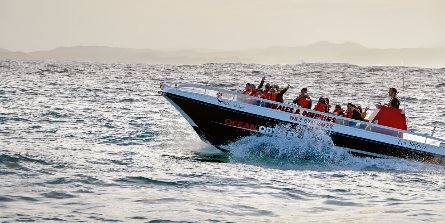Africa is synonymous with bush safaris, however a new trend has emerged, and with good reason – marine eco-tourism.
The United Nations dubbed 2017 the year of sustainable tourism for development. Eco tourism and sustainable tourism will continue to grow as travellers everywhere become more conscious of their responsibility as tourists.

Inge Altona-de Klerk, Head of Marketing for White Shark Projects, told Tourism Update that she had definitely noticed an increase in demand for marine eco-tourism, as has Evelyn Pepler, Owner of Ocean Odyssey in Knysna.
“The ocean and its creatures have always fascinated man and continue to do so,” says Altona-de Klerk. The Western Cape has a lot to offer, from boat-based whale watching tours to seal diving and shark-cage diving. Altona-de Klerk sums up the province as a marine eco-tourism Mecca.

She says clients are now seeking tourism activities that will educate them, as well as support conservation, research, and community projects. “More and more clients tend to ask environmentally charged questions before they book a tour, and marine tourism companies have had to evolve to keep up with them.
“Travellers will seek activities and products that align with their personal beliefs and resonate with their ethics, all in all creating maximum experience and minimum impact,” says Altona-de Klerk.

Pepler expands on this, saying: “True eco-tourism implies a tourism activity that is directed toward exotic natural environments, supports conservation efforts and observes wildlife. It is intended as a low-impact activity and is often a small-scale alternative to standard commercial mass tourism. It should be combined with responsible tourism, improve the wellbeing of the local communities, should involve education of the travellers and provide funds for ecological conservation, so that it directly benefits economic development.”
She attributes the growth of marine eco-tourism to travellers seeking more authentic and uncontrived activities, increased consciousness of responsible tourism and a desire to avoid doing things in large groups.
“Most travellers choose to do things away from the masses and enjoy private, interactive and authentic experiences. While they are still budget conscious, they are happy to spend a bit more knowing that they are getting a genuine experience,” says Pepler.

Altona-de Klerk advises operators and establishments to be audited and accredited by a third party, such as Fair Trade Tourism.
As for Ocean Odyssey, it has been accredited by the Wildlife & Environment Society of South Africa Blue Flag programme for four consecutive years for its vessels and operations. The company offers boat-based whale watching and marine eco tours.
White Shark Projects offers shark-cage diving tours and is continuously striving to improve and increase its eco-tourism status, whilst actively minimising its plastic footprint and impact on the ecosystem.
“White Shark Projects endeavours to inspire each and every client, hoping to turn them into shark ambassadors and ocean defenders by the time they return to shore. Introducing clients to the enigmatic Great White Shark and its plight is a responsibility that White Shark Projects lives and breathes, whether on board or on shore,” adds Altona-de Klerk.
Acacia Africa recently launched a three-day Marine Eco Tour based in Cape Town. The city stay has a strong focus on the conservation of the Marine Big Five (including dolphins, whales, seals and penguins). Clients are hosted by an expert Marine Biologist.

Arno Delport, Sales and Marketing Manager, commented: “With orcas having preyed on the Great White Shark population in recent months, the Gansbaai area is being monitored to understand this unusual behaviour. The new tour will give clients an opportunity to delve more deeply into the world of marine biology. The Great White Shark is a necessary predator and one that helps keep the abundant Cape fur seal population in check.”

Anita Lennox, Marketing Head of Cape St Francis Resort, said the resort offered the Chokka Trail, a coastal hike incorporating various natural aspects, one being marine eco-tourism. On the trail, guests get to explore the regions between St Francis Bay, Cape St Francis, Port St Francis and Oyster Bay, giving hikers the opportunity to experience the diversity of nature in the Eastern Cape on foot, at their own pace, with overnight accommodation. The trail affords guests the time to explore the natural waters and see circular rock walls in the water.























